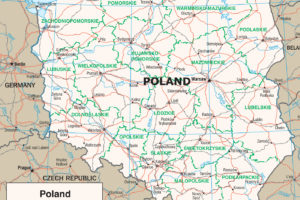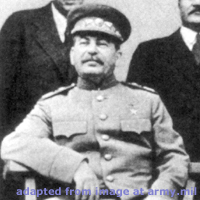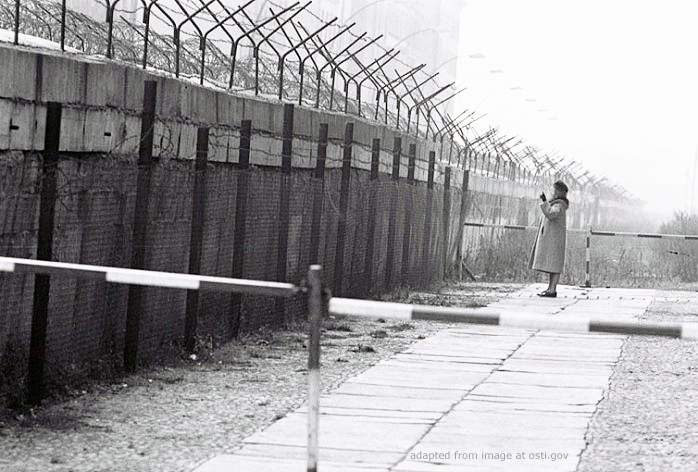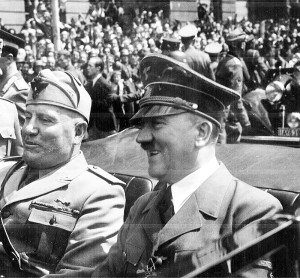Molotov-Ribbentrop What? Do Russians Know Of Key World War II Pact?

(Article text ©2019 RFE/RL, Inc., Radio Free Europe/Radio Liberty – rferl.org – Tony Wesolowsky, Matthew Luxmoore – August 22, 2019 – article text also appeared at rferl.org/a/molotov-ribbentrop-what-do-russians-know-of-key-wwii-pact/30123950.html)
It’s an anniversary few in the Kremlin, or elsewhere in Russia for that matter, are keen to talk about — let alone remember in some way.
 Eighty years ago, on August 23, 1939, Nazi Germany and Josef Stalin’s Soviet Union inked a nonaggression treaty that ushered in World War II.
Eighty years ago, on August 23, 1939, Nazi Germany and Josef Stalin’s Soviet Union inked a nonaggression treaty that ushered in World War II.
Commonly known as the Molotov-Ribbentrop Pact, after Soviet Foreign Minister Vyacheslav Molotov and German Foreign Minister Joachim von Ribbentrop, the agreement gave Adolf Hitler a free hand to attack Poland without fear of Soviet intervention. Behind the scenes, it was later determined, Hitler and Stalin had established secret protocols dividing Central and Eastern Europe into their respective “spheres of influence.”
 The pact brought devastation to the states and regions that were carved up, resulted in the deportation and killing of thousands from those areas, and paved the way for the Soviet domination of Eastern Europe behind the Iron Curtain after the war’s end in 1945.
The pact brought devastation to the states and regions that were carved up, resulted in the deportation and killing of thousands from those areas, and paved the way for the Soviet domination of Eastern Europe behind the Iron Curtain after the war’s end in 1945.
Russia has generally sought to minimize and relativize Stalin’s decision to align himself with Hitler in 1939. Russian President Vladimir Putin once condemned the pact as “immoral,” but has downplayed its significance on the few occasions he has mentioned it in recent years.
 Discussion of the secret protocols — which open up the issue of the Soviet invasion and occupation of Poland, just days after Germany’s invasion from the west — are a taboo topic.
Discussion of the secret protocols — which open up the issue of the Soviet invasion and occupation of Poland, just days after Germany’s invasion from the west — are a taboo topic.
Russia has largely adopted the Soviet narrative: World War II began not with the widely held start date of September 1, 1939, when Nazi forces attacked Poland, but in 1941, when Hitler unleashed his forces on the Soviet Union.
“There’s not much to be gained for Moscow in talking about 1939. Any focus on the pact contradicts the myth of the ‘Great Patriotic War’, which portrays the U.S.S.R. as a victim and lets the war begin in 1941,” explained Jan Claas Behrends, a historian at the Center for Contemporary History in Potsdam, near Berlin. “If you put the spotlight on 1939 it deconstructs this essential narrative.”
Political Tool
Glorifying elements of the Soviet past and blurring the lines over Stalin’s brutal legacy, critics say, has become a political tool for Putin, who has exploited nationalism to prop up his rule, now entering its third decade.
Efforts to whitewash Stalin’s crimes have apparently also influenced Russians’ views of the dictator, who was responsible for killing millions of Soviet citizens: a recent survey showed a record number felt he played a positive role in the country’s history.
Given all this, few are expecting Putin’s Russia to embrace discussion of the Molotov-Ribbentrop Pact.
In advance of this year’s anniversary, Russian officials presented a trove of archive documents allegedly proving that it was Hitler, not Stalin, who pushed for the pact and that the Soviet Union — well aware that Germany did not intend to uphold its pledge of nonaggression, and believing that the West was only interested in placating Hitler — had no choice but to sign it in order to buy time and ensure its security.
After decades of Kremlin stonewalling and obfuscation, a historical institute recently published what it said were the original pact documents, not copies as released in the past.
‘Shameful Episode’
Experts and historians say these new developments, especially the release of the alleged original Russian version of the nonaggression pact and its protocols, do not signal Russia is changing tack on interpreting this dark moment in its past.
“This is not part of an honest assessment of a shameful episode. Rather — it seems to me — it is a somewhat clumsy attempt to reassert control of the narrative of the Molotov-Ribbentrop Pact, a narrative that has been slipping from the Kremlin’s grasp in recent years,” explained Roger Moorhouse, a British historian and author of The Devils’ Alliance: Hitler’s Pact with Stalin, 1939-1941.
On the streets of Moscow, few Russians seem aware of the pact, or, if they are, didn’t think Stalin did anything wrong in agreeing to it.
Alesksandr Gadin, a 60-year-old pensioner whose grandfather served in the Soviet secret police, the NKVD, brushed off suggestions that Stalin had committed a crime by endorsing the pact.
Sipping a beer, Gadin said territory seized by the Soviet Union under the secret terms of the deal — the three Baltic states, a large chunk of Poland, plus parts of both Finland and Romania — had long belonged to Russia.
“Those Eastern European countries, they think we occupied them,” he said, referring to a swath of the continent that belonged to the Russian Empire before being seized by the Soviet Union. “But they were ours long before the war started.”
Gadin suggested Europe’s interpretation of the war was inaccurate.
“I’m not for the Soviet Union — I disliked a lot of things about it. But the way World War II is portrayed in Europe is not right,” he told RFE/RL, without giving specifics. “There’s a sense that you fear us, or just don’t understand us.”
Zhanna Shishmaryova, a 30-year-old marketing specialist, said she had never heard of the Molotov-Ribbentrop Pact.
But like Gadin and others interviewed in the Russian capital, she alleged that Europe was muddying the historical record to either downplay or tar the Soviet Union’s role in conquering fascism.
“I don’t like the way Europe portrays the war. I think the United States, in cooperation with other countries, tried to distort the truth of what happened.”
“They say Russia took no part,” Shishmaryova said, without clarifying who in the West makes such assertions. “But we lost so many people to that war.”
Galina Kotova, a 25-year-old doctor, agreed. Like Gadin, she had not heard of the pact, but suggested that the West was tarnishing Russia’s past.
“They’re always blaming us for something,” she said. “It’s always been like that.”
Whether kids in Russian classrooms today are learning the whole story behind the Molotov-Ribbentrop Pact is doubtful.
In September 2016, three history textbooks were approved by the Education Ministry, all of which whitewash Stalin’s crimes and his nonaggression pact with Hitler.
Olga Vasilyeva, who had become education minister earlier that year, has defended Soviet policies and made controversial statements about Stalin.
Tatyana Uvarova, a history teacher at Moscow School No. 1551, said the amount of class time devoted to discussion of the pact depends largely upon the teacher and the school. The pact is usually touched upon in later grades, with recent changes shifting it to the 10th-grade curriculum.
‘Very Sensitive Question’
On the question of Poland’s secret dismemberment by the two totalitarian regimes, knowledge of which has gradually spread in Europe, Uvarova equivocates.
“This is a very sensitive question,” she said. “People here don’t quite see it that way. And please don’t forget that many Russians see the Soviet Union as the Russian Empire, and various territories were part of the Russian Empire. So this is sometimes presented as a reacquisition of lost territory.”
Less than two years after signing the nonaggression pact, Nazi Germany invaded the Soviet Union on June 22, 1941, in Operation Barbarossa. By war’s end, the Soviet Union had lost some 25,000,000 people, while the Red Army arguably did the bulk of the fighting in the European theater.
Putin and his government have focused on Soviet sacrifices in the war and its role in defeating Nazi Germany, with little mention of the part played by its wartime allies.
Back in May, shortly before the 75th anniversary of D-Day, Russian Foreign Ministry spokeswoman Maria Zakharova noted the Normandy landings that freed Western Europe from Nazi occupation. The historic Allied effort, Zakharova said, did not impact the course of the war, which had already been “predetermined” by the sacrifices of the Soviet Red Army.
In 2009 in Poland, on the 70th anniversary of the pact, Putin called it “immoral” before blaming the West for refusing to back the Soviet Union.
Five years later, Putin was still blaming the West — in particular Britain and France — for Hitler’s crimes, but he said the nonaggression pact between Germany and Russia was nothing extraordinary.
Instead, he urged young historians to dig into the details leading up to the war, among other subjects.
According to Putin, Western historians today “hush up” the 1938 Munich Agreement, in which France and Britain — led by Neville Chamberlain, Britain’s prime minister — appeased Hitler by allowing him to annex Czechoslovakia’s Sudetenland.
“Chamberlain came, waved a piece of paper and said, ‘I’ve brought you peace’ when he returned to London after the talks,” Putin said five years ago.
“To which [Winston] Churchill, I think, said somewhere to a small group of people, ‘That’s it, now war is inevitable’. Because compromise with an aggressor in the form of Hitler’s Germany was clearly leading to a large-scale future military conflict, and some people understood that.”
Other Russian officials have also defended the Soviet alliance with the Nazis. Culture Minister Vladimir Medinsky, known for his pseudo-historical novels, has said that the pact “deserves a monument.”
That Stalin had no choice, and that the pact was defensive in nature, has long been a key part of Moscow’s narrative.
On August 14, Russian media, among others, reported that historians in Moscow had discovered a trove of documents related to prewar bilateral relations between Germany and the Soviet Union.
The documents, reportedly covering the years 1932 to 1941, show that Nazi Germany was the “initiator” of the nonaggression pact, according to Sergei Naryshkin, the chairman of Russia’s Military-Historical Society.
“Not wishing to wage war on two fronts, Germany agreed to unprecedented concessions to guarantee Soviet neutrality during its Polish campaign,” Naryshkin, also the head of Russia’s Foreign Intelligence Service and a Putin ally, was quoted as saying on August 14 by the state news agency RIA-Novosti.
It wasn’t the first such discovery. To little fanfare, the Historical Memory Foundation published on May 31 what it said were the original copies of the Russian-version of the Molotov-Ribbentrop Pact, including the secret protocols. It said the documents were obtained from the historical and documentary department of the Russian Foreign Ministry.
‘All The West’s Fault’
Putin had nothing to lose by allowing the original copies to be released, argued Paul Goble, a longtime expert on Eurasia.
“First, Putin is flaunting the pact now to show that he really doesn’t care what the West thinks, something that plays to his base and that he can get away with because Western leaders with their own problems aren’t willing to face up to what he is doing,” Goble said. “And second, Russian commentators and following them Russian teachers are increasingly returning to the Soviet description of the pact: it is all the West’s fault.”
To Behrends, the Molotov-Ribbentrop Pact symbolizes Putin’s desire to return to spheres of influence.
“Before 1914 Eastern Europe was ruled by empires. Sovereign nation states came into being after World War I. The Nazi-Soviet pact of 1939 marked the return of imperial domination. Eastern Europe fell either under Nazi or Soviet occupation,” Behrends explained.
But for most Russians the existence of the pact, let alone its significance, will likely remain off the collective radar.
Uvarova, the teacher, said that with the school year starting on September 1, there will be no classroom events to mark the 80th anniversary of the pact on August 23.
“But it wouldn’t be marked anyway, to be honest,” she said. “September 1 would be marked as the start of World War II” if lessons on that topic were held on the first day of school.
“But the Molotov-Ribbentrop Pact would not,” she said. “We don’t draw attention to it.”
